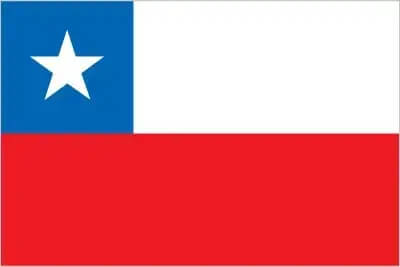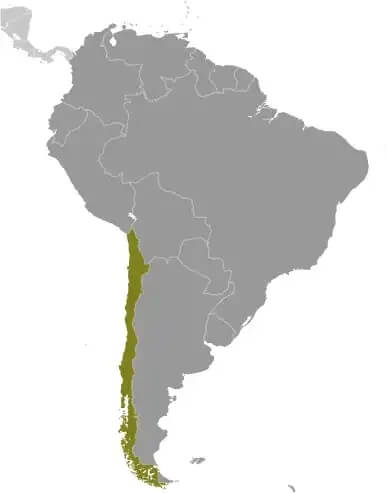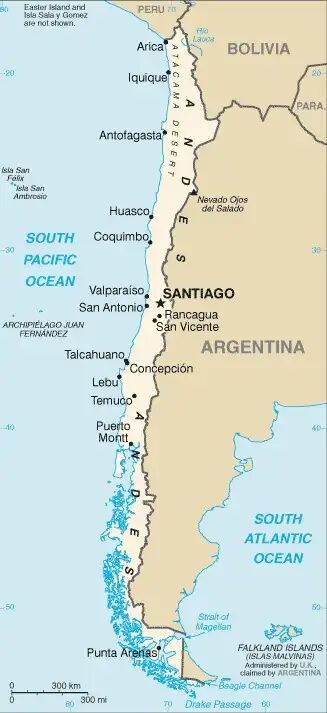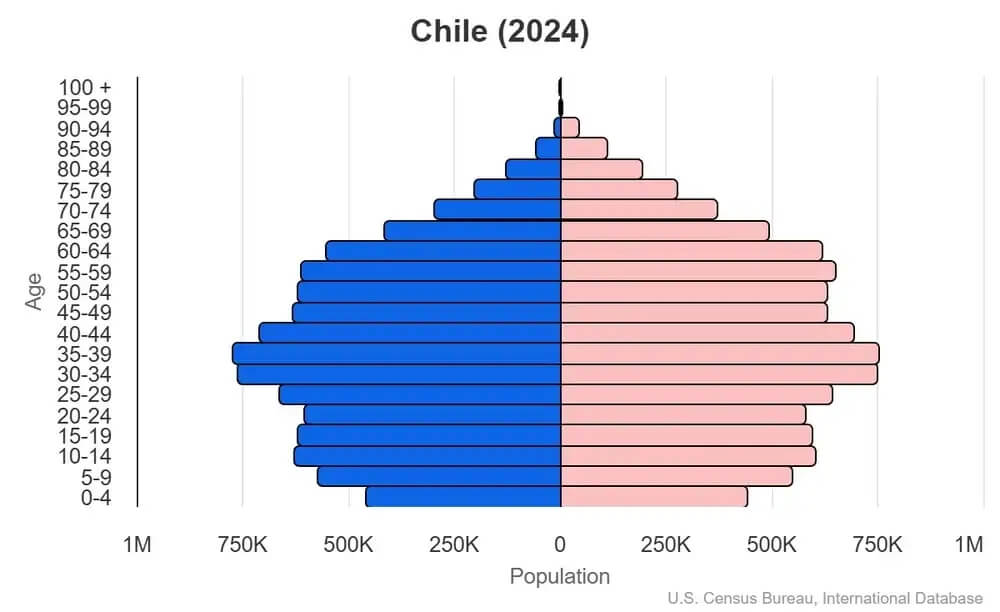World Book
Chile
World Book Index
75


With a score of 75, the country is ranked 44th out of 158 countries in the World Book ranking. (more information)
Introduction
Prior to the arrival of the Spanish in the 16th century, the Inca ruled northern Chile for nearly a century, and an indigenous people, the Mapuche, inhabited central and southern Chile. Chile declared its independence in 1810 but did not achieve decisive victory over the Spanish until 1818. Chile has increasingly assumed regional and international leadership roles befitting its status as a stable, democratic nation.
Neighboring countries
Argentina - Bolivia - Peru
Geography
Area
total: 756,102 sq km
land: 743,812 sq km
water: 12,290 sq km
Climate
temperate; desert in north; Mediterranean in central region; cool and damp in south
Natural resources
copper, timber, iron ore, nitrates, precious metals, molybdenum, hydropower
People and Society
Population
total: 18,664,652 (2024 est.)
Ethnic groups
White and non-Indigenous 88.9%, Mapuche 9.1%, Aymara 0.7%, other Indigenous groups 1% (includes Rapa Nui, Likan Antai, Quechua, Colla, Diaguita, Kawesqar, Yagan or Yamana), unspecified 0.3% (2012 est.)
Languages
Spanish 99.5% (official), English 10.2%, Indigenous 1% (includes Mapudungun, Aymara, Quechua, Rapa Nui), other 2.3%, unspecified 0.2% (2012 est.)
Religions
Catholic 57%, none 25.7%, Evangelical or Protestant 16.2%, other Christians and traditions related to Christ 1.3%; less than 1%: Buddhist, Catholic Orthodox, Church of Jesus Christ of Latter-Day Saints, Islam, Judaism, other religions, no religion (2024)
Population growth rate
0.61% (2024 est.)
Government
Government type
presidential republic
Capital
name: Santiago; note - Valparaiso is the seat of the national legislature
Executive branch
chief of state: President Gabriel BORIC (since 11 March 2022)
head of government: President Gabriel BORIC (since 11 March 2022)
Diplomatic representation in the US
chief of mission: Ambassador Juan Gabriel VALDES Soublette (since 7 June 2022)
Diplomatic representation from the US
chief of mission: Ambassador (vacant); Chargé d'Affaires Richard T. (Rick) YONEOKA (since January 2025)
Economy
Economic overview
export-driven economy; leading copper producer; though hit by COVID-19, fairly quick rebound from increased liquidity and rapid vaccine rollouts; decreasing poverty but still lingering inequality; public debt rising but still manageable; recent political violence has had negative economic consequences
Real GDP (purchasing power parity)
$596.556 billion (2024 est.)
$581.187 billion (2023 est.)
$578.173 billion (2022 est.)
Real GDP per capita
$30,200 (2024 est.)
$29,600 (2023 est.)
$29,600 (2022 est.)
Exports
$111.123 billion (2024 est.)
$103.256 billion (2023 est.)
$107.039 billion (2022 est.)
Exports - partners
China 39%, USA 16%, Japan 7%, S. Korea 6%, Brazil 4% (2023)
Exports - commodities
copper ore, refined copper, fish, carbonates, pitted fruits (2023)
Imports
$99.239 billion (2024 est.)
$100.082 billion (2023 est.)
$118.928 billion (2022 est.)
Imports - partners
China 23%, USA 20%, Brazil 10%, Argentina 7%, Germany 5% (2023)
Imports - commodities
refined petroleum, crude petroleum, cars, garments, trucks (2023)
Human Development Index
The country's Human Development Index (HDI) is 0.878, ranking it 45th out of 193 countries tested. (more information)
World Happiness Report
The World Happiness Report ranked the country 39th out of 158 countries tested with a score of 6.36. (more information)



